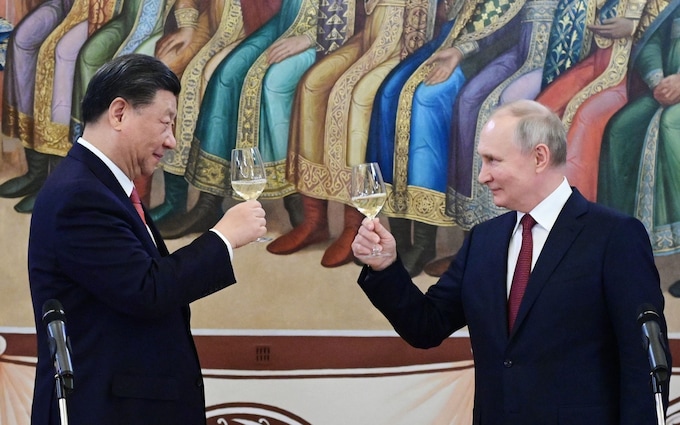
Before 1914, the world lived in the era of the Great Powers. After 1945, we had the Cold War and the two superpowers. Then, after the collapse of the Soviet Union and the Eastern Bloc, we had the unipolar era of Western hegemony – one that we are now told is coming to an end.
A quarter of the way into 2023, the phrase of the year so far seems to be “multi-polarity”. Where once America bestrode the globe, able to intervene in the air and on the ground everywhere from Somalia to Kosovo to Iraq, the rules of the game have changed. With the Iraq invasion ending in failure and a panicked withdrawal from Afghanistan, the West looks considerably less hegemonic. New powers are on the rise, and the meeting last week between Xi Jinping and Vladimir Putin marked a coming together of those rising forces in their opposition to the West.
That, at least, has been the prevailing narrative. There is no doubt that the West has experienced setbacks. But those are nothing new; the Cold War was not lost despite stalemate in Korea and embarrassment in Vietnam. As for the return of Russia and the re-emergence of China, the narrative of a new Cold War and a multipolar world is lacking a crucial element: demography.
Human numbers – particularly of young people – are a crucial and often overlooked determinant of world affairs. And demographically, neither the Bear nor the Dragon is in good shape.
The Russians have had too few children to replace themselves since the days of Khrushchev. Putin’s efforts to get the birth rate up have had limited and, it would appear, merely temporary effects. If Russia has not aged as much as some other countries, it is not because of a fresh blush of surging youth but because too many of its late-middle aged, particularly men, die of alcoholism and despair.
Life expectancy in Russia is comparable with that in India and Egypt, but whereas people in these countries are living much longer than they used to, Russians have seen 60 years of stagnation. Meanwhile, the Kremlin finds itself ruling a country short of young men. Too few were born 20 to 30 years ago, and this demographic weakness has been amplified as many have fled the war.
This has deprived Putin of cannon fodder, but it also means that even fewer Russian babies are going to be born in the years to come, storing up problems for the economy and draining Moscow of its potential military manpower for decades. Hundreds of thousands of men will not be fathering Russian children because they are either seeing the crisis out in Tbilisi or dead in the fields of Ukraine.
China, meanwhile, is suffering the calamitous consequences of its One Child policy. Imposed iniquitously and lifted too late to make a difference, its legacy is a population – and in particular a young population – that is already falling, and is likely to halve by the end of the century.
Beijing has already lost top spot in the demographic league table to India, whose population is now bigger and has decades of growth ahead of it. There will still be plenty of young men to send to whatever battles the Communist Party decides to pick, but China’s manpower advantage is set to shrivel. And with an ageing population struggling to keep the lights on, it will not conjure up much enthusiasm for foreign adventures.
This is not to say that all is demographically well in the West. Fertility rates everywhere are below what they need to be. But if it chooses, the West can still offer a lifestyle attractive enough to draw vast numbers of immigrants to work in its industries and nurse in its hospitals. Immigration is at best a temporary fix to demographic weakness and it may be disliked by some, but at least for the likes of the US, the UK and Germany it remains an option. By contrast, few now wish to go to Russia, and even if they wanted to go to China (or were wanted), they would be a drop in the ocean.
China and Russia, individually or together, still have great nuisance potential. The damage wreaked by Putin’s soldiers in Ukraine is testimony to that. But as the West girds itself to confront the challenge, it should take comfort from the soft demographic underbelly of its opponents. The new Cold War may already be over. DT.


.jpeg)